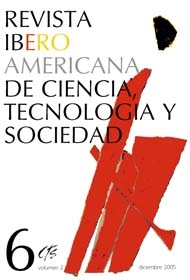Editorial
Resumo
Assistimos diariamente a declarações que destacam a necessidade de fortalecer a participação cidadã em temas de ciência e tecnologia por meio de uma opinião pública informada. Nessa lógica, considera-se que a capacidade dos cidadãos de se envolverem e participarem dependerá, em grande medida, das atitudes e percepções que a sociedade tem sobre as potencialidades, os limites e os riscos que a ciência e a tecnologia apresentam no mundo contemporâneo. É evidente que as políticas de comunicação e divulgação não são suficientes para enfrentar esse desafio. A educação — o espaço onde se formam os futuros profissionais e cidadãos — deveria conter boa parte das respostas, das possibilidades de êxito ou fracasso, para esse tipo de diretriz que se defende.
Downloads
Downloads
Publicado
Como Citar
Edição
Seção
Licença
Copyright (c) 2025 CC Attribution 4.0

Este trabalho está licenciado sob uma licença Creative Commons Attribution 4.0 International License.
Todas os números de CTS e seus artigos individuais estão sob uma licença CC-BY.
Desde 2007, a CTS proporciona acesso livre, aberto e gratuito a todos seus conteúdos, incluídos o arquivo completo da edição quadrimestral e os diversos produtos apresentados na plataforma eletrônica. Esta decisão é baseada no entendimento de que fornecer acesso livre aos materiais publicados ajuda a ter uma maior e melhor troca de conhecimentos.
Por sua vez, em se tratando da edição quadrimestral, a revista permite aos repositórios institucionais e temáticos, bem como aos sites pessoais, o autoarquivo dos artigos na versão post-print ou versão editorial, logo após da publicação da versão definitiva de cada número e sob a condição de incorporar ao autoarquivo um link direcionado à fonte original.











